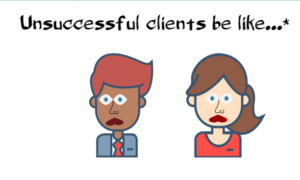Successful clients demonstrate certain characteristics that allow them to make the most of our session together.
The characteristics I am speaking of most likely represent you if you are reading this and are as follows:
- Open to hearing my observations as an objective party only interested in your growth.
- Truly willing to step outside of your comfort zone to experiment with new ideas.
- Self-reflective and able to recognize personal strengths and limitations and courageous enough to share when you feel like new behaviors will need extra support.
- Willing to respectfully disagree when suggestions or observations do not resonate with you and open to offer alternate hypotheses.
- Able to acknowledge mistakes and reflect on and build from what you have learned.
- Support friends, family, and colleagues in their growth instead of competing with them and creating an atmosphere of opposition and rivalry.
- Acknowledge how others have participated in your growth. This could come from both those who supported and challenged you.
- Committed to the process by valuing the session time and structure and completing “homework” between sessions with integrity.
On the other hand…
Certain characteristics detract from the growth mindset that is so vital to successful personal development.
When I review this list, I find that I have and still do engage in some of these characteristics from time to time, and I suspect that you will recognize some of these too in your own behavior. Most important is that you recognize these behaviors and work toward more productive responses.
- Resistance to change. Putting energy into maintaining the present state though that state serves as ineffective, or at its worst, a detriment to growth.
- Failure to look at a situation with fresh eyes. Though it may seem that you have tried it all before. Sometimes the solutions are applied with an everything-but-the-kitchen-sink approach. To systematically attempt a solution with integrity while monitoring changes, can truly show what is and is not an effective solution.
- We all love the know-it-all, don’t we? Most of us have been this person at one time or another. But what comes across is that you are closed off to any form of constructive support when you convey an attitude of knowing everything. Even if you do have a sense that you know certain information, listening to another’s perspective may provide insight from another frame of reference.
- I’ll scratch your back if you scratch mine syndrome is a transactional and mechanistic approach that tends to create relationships based on out-dueling your partner. It is about having a winner and a loser. On the other hand, transformational relationships are based on mutual respect and an understanding that it is in giving that we receive.
- Avoid disagreement. So often, we have been conditioned that disagreeing is bad. It is not the disagreement which causes the problems, it is in the way that we disagree. If our disagreement tendency is to draw a line in the sand and fight to win, then there is little to gain. By the same token, many of us clam up when we feel like we are being criticized, constructive or not, due to our concepts around disagreement. Reframing disagreement as a means to find common ground opens us up to better understanding ourselves and those around us…except for those on the other side of our political convictions. They are just ignorant (I’m kidding of course).
- WATCH OUT FOR THAT….(thump, thump, thump, thump)…bus… Blaming others for mistakes because we did our job is a set up for team destruction. When working toward a common goal, the end result is vital. It is not about “just doing my job”. It is about getting the job done well. Successful people support others getting the job done right. That means that you do your job to the very best of your ability AND give your all to make the team function smoothly (whatever that team may be – family, work, volunteer,etc).
- Acknowledging only what you have done to find success comes off as rather self-centered and ungrateful. Nobody made it to where they are without the support, encouragement, and resources of others. Be profuse in your praise of those who have lifted you up along the way.
- You may be measured more by what you say about somebody when they are not around than what you say as you stand before them. Qualifying a statement with, “I’d say this right to there face”, does not mean it is no longer gossip. Be aware of your intentions when you share information about another person. Are you celebrating another’s victories, sharing their sorrows, or just putting them in their place? If it paints the subject in a bad light and does not serve to help the receiver, then it is probably best to keep it to yourself. It is one thing to share your experience as objectively as possible when another is facing a similar engagement and quite another to just bash another.
- Drifting from place to place and thing to thing can seem carefree, but I’d suggest that it could be rooted in a fear of failure. As it has been said many times, the surest way to fail is to not try. Having dreams and setting goals puts you on a trajectory of personal growth. You may reevaluate at a later time and change direction, but you always have the experiences you encountered along the way from which to draw. With assurance, I can say that no matter how much your path changes, prior learning will inform your new direction. THIS may be the trait to which I must most closely attend. I do fear that if I set a goal I may fail. And I do now recognize that not having certain specific goals keeps me from doing the every day tasks that would propel me toward my dreams.
- You might say it seems unimportant, but when you make a commitment to yourself or others, it is vital to keep it or to address it in a proactive way. If you no longer see relevance, have that conversation and make a new more relevant commitment. It colors the way you are perceived by others and impacts the trust others have in you. Blowing off a commitment burns bridges, plain and simple. It keeps you from progressing.


